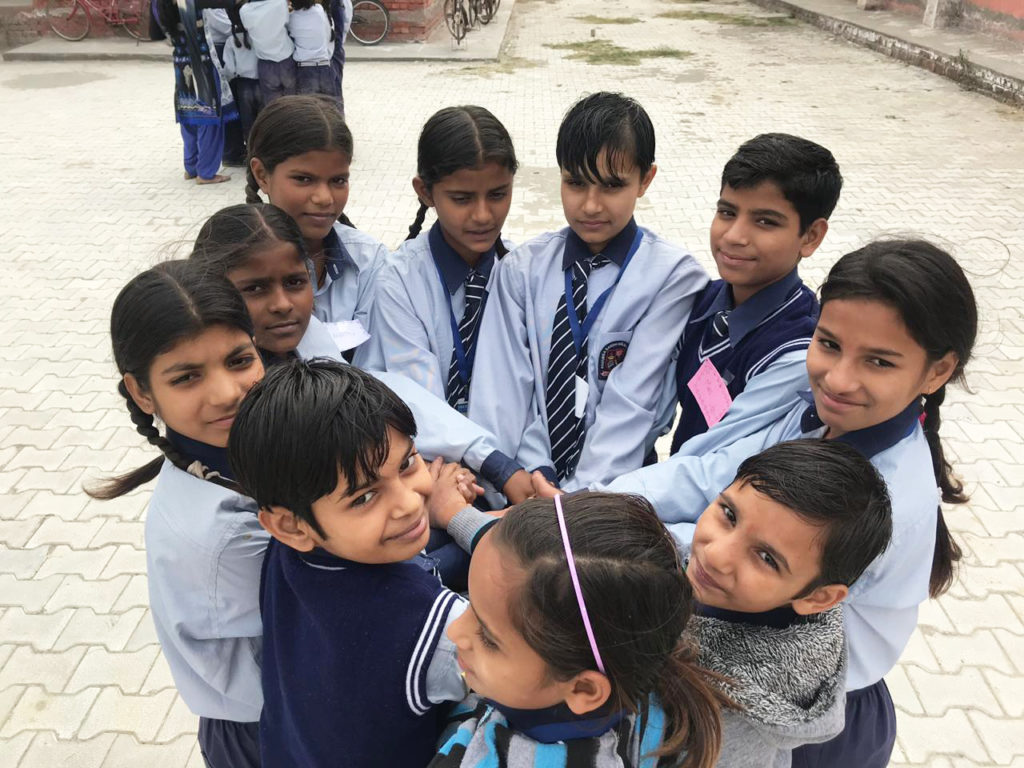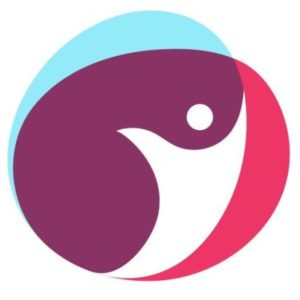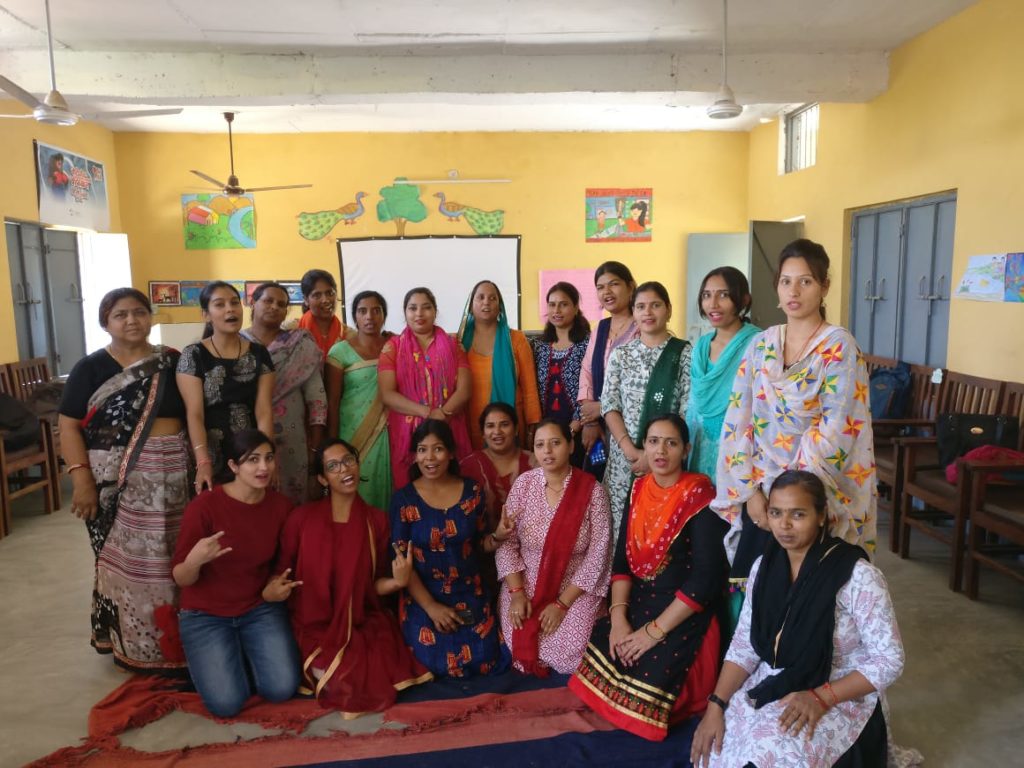Seema is a 12-year-old Dalit girl from Bihar, one of the poorest states in India. In the social hierarchy, Dalits in India belong to the lowest strata, often devoid of education and job opportunities, and have compromised rights. On one hot day, rather than being in class studying, she was clinging to a pillar crying before her parents, urging them not to take her home and not to have her married. She wanted to go to school and she wanted to study.
In American middle schools, most 12-year-old girls are looking forward to high school. Most cannot picture leaving school before even starting high school, let alone being married before that time. Yet in many parts of the world, girls struggle to get an education and even go beyond secondary education. Seema is one of those, and she is not alone.

Middle school girls doing the human knot activity for problem solving, in KGBV Panipat, Haryana, India
India, even today, has 102 million child brides, and research suggests that access to education is the most important deterrent, potentially impacting the poorest, most isolated, and most underprivileged girls. Members of scheduled castes and tribes (officially designated groups of historically disadvantaged people), and other “backward classes” (another official designation) were between 33 and 50 percent more likely than a high-caste women to marry before age 18, as of 2005-2006.
As a result, the Indian government started Kasturba Gandhi Balika Vidyalayas (KGBV) residential schools in some of the remotest and most underserved areas of 27 Indian states. The girls stay in these facilities for three years, and are provided free clothing, food, and school material, attending the nearby middle schools during the day.
KGBVs began with a vision of providing access to quality education to girls. However, these schools currently are characterized by poorly paid teachers without access to further educational training programs, lack of educational resources for both students and teachers, and extreme isolation between schools. Despite the KGBV’s founding goals, the majority of girls drop out of school after eighth grade and are married off. There is no higher education for them.
Child marriage is associated with low levels of decision-making power within a family, increased vulnerability to violence, and limited access to social and economic resources. Girls who live in rural areas or come from poorer households are at greater risk, and a higher proportion of child brides is found among those with little or no education. Less than 30 percent of highly educated women married before 18, compared to 77 percent of uneducated young women. Research argues that child marriage prevention programs should focus on keeping girls in school as a key strategy. By empowering girls and mobilizing these communities, it has enormous potential for impact.

A KGBV girls’ residential school in Haryana
Formal education, completing school, and gaining skills to negotiate key life decisions are not guaranteed to Indian girls in these parts of society. SwaTaleem, an award-winning non-profit organization, is working with students, teachers, and government officials to provide these opportunities to these students. SwaTaleem is a highly passionate and interdisciplinary team with a total of 15 years of educational experience. Ananya, a cofounder, has participated in the design of education programs for more than 100,000 teachers and one million children. Both Vaibhav, another cofounder, and Ananya have also been schoolteachers themselves, and want to give back to society by working for the highly neglected.
SwaTaleem is a combination of “Swa” (meaning “your own” in Sanskrit) and “Taleem” (meaning “education” in Persian), standing for “Owning your Education.” Using a human-centered design, school communities are created around teachers, girls, and officials who choose educational challenges together. Focusing on these selected challenges, a curriculum is designed for the teachers that incorporates socioemotional skills along with finding solutions to the chosen challenge, also training the teachers. Along with field coordinators, these trained teachers work to incorporate relevant skills in the classroom and pass them down to the female students. Focused on transforming the system itself, SwaTaleem creates knowledge centers of four or five schools which are called clusters. These clusters help provide the support system between teachers that they currently lack.
This journey benefits multiple stakeholders. Students and teachers perform better in their spaces, the government gets higher school and development indicators, and funders join a journey to tackle global poverty through education. The plan to revitalize school quality allows teachers access to education development resources multiple times a month, enriching their teaching qualifications beyond their original teaching certification. Students and teachers have the chance to better understand each other and identify further needs in the classroom, through discussions and surveys that bring attention to structural changes that are succeeding and possible faults that need addressing. The impact of this new school structure can lead to better attendance, higher interest, and improved emotional intelligence for each student. Schools will have higher performance scores in academics and enroll more female students, as well as attracting more funding due to continued success. As school and student performance increases, government officials for each school community will have a better awareness of the school and be able to gather more funds for a successful school.
Incorporated in December, 2018, SwaTaleem successfully completed its pilot program with 90 girls in January. During the pilot, the chosen educational challenge was the lack of a science lab in school. SwaTaleem worked by creating public platforms to give voices to teachers and students, where they came together and engaged in collective problem solving and goal setting. Science-based workshops and other resources were employed for skill-based training. Teamwork and decision making throughout the process strengthened the socioemotional skills of the group. In a span of three months, the girls created 30 projects from scratch and exhibited their work for the first time, in front of the community that included their parents. Teachers and girls reported higher levels of confidence, assertive communication, and problem solving.
As a result of this success, the Government of Haryana, India signed a Memorandum of Understanding with SwaTaleem to scale the program to all of Bihar. SwaTaleem currently works with 900 girls and plans to reach 2000 more girls in the next ten months, improving educational quality for thousands more underprivileged girls in India and allowing them to reach their full potential as students—to be able to continue into higher education and have more career and life possibilities. SwaTaleem has raised more than $48,000 for this goal, and was presented the Life Paths Promising Advocate Award at the 2019 Life Paths Research Center Resilience Conference. It was also selected for support by four international accelerators for its work.

Some members of SwaTaleem Team, UIUC (Marco, Anica, Shafagh, Ananya, Rashi, Natasha)
However, in order to reach thousands more students, SwaTaleem needs more support, and is running an online campaign to gather more funds to continue its work and uphold its goal: building a world where completing a formal education is not the exception, but the norm. George Bernard Shaw once said, “The reasonable man adapts himself to the world: the unreasonable one persists in trying to adapt the world to himself. Therefore all progress depends on the unreasonable man.”
This time it will be the unreasonable girls.
Please reach out and support us on Facebook, LinkedIn, and Instagram. For any queries, drop an email to swataleem@gmail.com
The SwaTaleem Foundation, partly operating from Urbana-Champaign, works with 900 girls in India to improve their educational outcomes.



